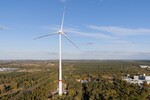08/19/2004
UK wind industry calls for key actions on planning
The UK wind industry has warned that unless the time taken to receive planning decisions is speeded up, the UK runs the risk of not meeting the 2010 10% renewable energy target. New research released today by BWEA shows that the length of time taken through planning for onshore wind farm applications is three times greater than the recommended guide time for all developments, with decisions taking nearly one year from submission and continuing to increase. The major conclusions of the research which examined planning decisions since 1999 are that in England, the average time for projects in planning has increased from an average of 9.4 to 11.2 months, three times that of the guide length of 16 weeks for major applications; Section 36 projects3 in Scotland are taking between two to three years to come to a determination while the most worrying trend is that only 5% of wind energy schemes are determined within 13 weeks. This data is significantly out of step with other major projects4, 44% of which are determined within 13 weeks.
Onshore wind energy has been repeatedly identified as critical to meeting the UK’s 2010 targets that 10% of electricity supplies come from renewable energy technologies. The UK has 767 megawatts (MW) of wind generating capacity installed now with planning consent awarded for a further 1306 MW, from both on and offshore projects. However, an additional 2,168 MW of onshore capcity needs to be consented by 2007 if onshore wind is to meet its expected contribution to the 2010 target.
BWEA is therefore calling for three key actions to ensure that this is achieved and to ensure that the planning system is streamlined and made more efficient for all renewable proposals, namely:
1. More resources for decision making authorities, at the local level and particularly for Section 36 teams;
2.The immediate publication of PPS22 to provide the necessary policy framework and guidance urgently required by local policy formers and decision makers;
3.Streamlining and simplification of the process so that post planning condition delays6, which can often add a further 12 months, are minimised.
Onshore wind energy has been repeatedly identified as critical to meeting the UK’s 2010 targets that 10% of electricity supplies come from renewable energy technologies. The UK has 767 megawatts (MW) of wind generating capacity installed now with planning consent awarded for a further 1306 MW, from both on and offshore projects. However, an additional 2,168 MW of onshore capcity needs to be consented by 2007 if onshore wind is to meet its expected contribution to the 2010 target.
BWEA is therefore calling for three key actions to ensure that this is achieved and to ensure that the planning system is streamlined and made more efficient for all renewable proposals, namely:
1. More resources for decision making authorities, at the local level and particularly for Section 36 teams;
2.The immediate publication of PPS22 to provide the necessary policy framework and guidance urgently required by local policy formers and decision makers;
3.Streamlining and simplification of the process so that post planning condition delays6, which can often add a further 12 months, are minimised.
- Source:
- BWEA
- Author:
- Edited by Trevor Sievert, Online editorial journalist
- Email:
- press@windfair.net
- Keywords:
- BWEA, onshore, offshore, wind energy, wind turbine, wind power
























